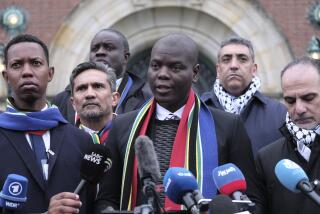Uncertainties in Pinochet Case
- Share via
A very basic notion of justice is driving two Spanish judges to seek British compliance with their request to hold Gen. Augusto Pinochet, the former Chilean dictator, for questioning and possible extradition to Spain in connection with his long, cruel reign. It’s an unusual request and demands unusual attention.
Judges Manuel Garcia Castellon and Baltazar Garzon gathered evidence on the deaths of Spanish citizens in Chile during Pinochet’s rule in the 1970s. Provided with details of their case, British authorities agreed to put a hold on Pinochet, in London for minor back surgery. Specifically, the Spanish want to interrogate him about the deaths of more than 3,000 Chileans and other opponents of his rightist regime.
What seems a clear case in fact, however, is hardly a clear case in law. The Spanish prosecutors want Pinochet tried for the deaths of Spanish citizens and thus have invited prosecutors from other countries whose citizens were killed under Pinochet’s regime to join their cause. But a thicket of legalities awaits.
The atrocities committed by Pinochet’s military are well documented. But can a former national president who has been granted immunity at home be arrested abroad for past human rights abuses? Did Britain violate the diplomatic immunity that the Chileans claim Pinochet was entitled to?
International rules governing war crimes and crimes against humanity are still evolving and unsettled. Under whose law can an accused person be extradited? To whom can the protections of diplomatic immunity apply?
Judge Garzon’s request for extradition must be approved by the Spanish Cabinet. These developments will play out in coming days, but there is nothing in the case so far that can give comfort to brutal rulers. The world is offering them fewer havens and more sleepless nights. Finally we hear the wheels of justice turning.
More to Read
Sign up for Essential California
The most important California stories and recommendations in your inbox every morning.
You may occasionally receive promotional content from the Los Angeles Times.













